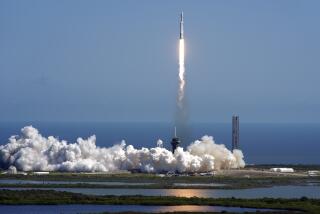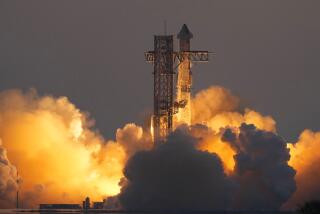SpaceX rocket makes historic landing after launch. ‘Welcome back, baby,’ Musk tweets.
Elon Musk’s SpaceX not only blasted 11 satellites to orbit Monday night, but also brought the towering first-stage booster back down, with a historic landing at Florida’s Cape Canaveral.
It was the company’s first launch since its unmanned rocket carrying cargo to the International Space Station exploded June 28 — a failure that had tarnished the company’s long string of successes.
SpaceX employees at the company’s Hawthorne headquarters gave high-fives, cheered and chanted “U.S.A., U.S.A.” after the rocket touched down on a concrete pad about 10 minutes after the liftoff at 5:29 p.m. Pacific time.
“Welcome back, baby!” Musk tweeted after the landing.
The company says it intends to try to reuse the first-stage booster and its nine engines — an engineering feat that could ultimately help to sharply reduce the cost of space travel. It is the first time that a rocket has been successfully landed during a commercial launch.
“This is great for the industry,” said Eric Stallmer, president of the Commercial Spaceflight Federation, shortly after the landing. “It will push us to boundaries where we haven’t gone before.”
The successful landing comes at a crucial time for America’s commercial space industry.
SpaceX had become the sector’s rising star, winning contracts for dozens of launches from governments and companies around the world.
And the June 28 explosion of the cargo-hauling rocket it was operating for NASA was the third failure for America’s commercial space industry in less than a year.
The much-anticipated launch of the satellites for Orbcomm, a New Jersey company, had been repeatedly delayed as SpaceX employees worked through glitches that came with a redesign of the rocket aimed at giving it more power.
On Thursday, with the rocket vertical on the Florida launch pad, Musk tweeted that the super-chilled liquid-oxygen fuel was “presenting some challenges.”
When everything then looked like a go Sunday, Musk tweeted that he had decided to wait one more day when conditions for landing the rocket looked 10% better.
Musk has already tried twice to land the Falcon 9 on an unmanned ocean barge the size of a football field. The rocket successfully turned around, slowed from supersonic speeds and hit its target on the barge. It then crashed both times, falling into the sea.
Landing the rocket and making spacecraft reusable has been a longtime quest of aerospace engineers.
Musk faces competition from billionaire Jeff Bezos, who is also trying to build recyclable rockets. Last month, the Amazon.com founder revealed that his space company, Blue Origin, had successfully landed an experimental test rocket at its launch site in West Texas. It plans to use the rocket again.
“Full reuse is a game changer,” Bezos said then, “and we can’t wait to fuel up and fly again.”
After SpaceX’s successful landing Monday night, Bezos tweeted his congratulations — and a reminder that he got there first: “Welcome to the club!”
But SpaceX’s Falcon 9 is a much different rocket from the one flown by Blue Origin.
Musk’s company launches satellites into orbit and flies cargo to the space station under contract from NASA. Blue Origin, on the other hand, has built a much smaller ship designed to eventually fly passengers to sub-orbital space for a few minutes.
“These two guys are driving each other,” Stallmer said, “and I think that’s fantastic.”
The June 28 destruction of the SpaceX Falcon 9, as well as the supplies and equipment needed aboard the space station, cost NASA and taxpayers hundreds of millions of dollars.
It also left NASA without a cargo-hauling ship. Eight months before, a rocket operated by the space agency’s other contractor, Orbital ATK, had exploded just seconds after liftoff from a Virginia launch pad.
Three days later, Virgin Galactic’s experimental SpaceShipTwo broke up 10 miles above California’s Mojave Desert on a test flight, killing one of two pilots.
In July, Musk blamed his rocket’s failure on a 2-foot long steel strut that had been holding down a helium bottle on the rocket’s second stage.
Follow me on Twitter @MelodyPetersen
ALSO
One mother spent a decade after her daughters’ deaths changing car-rental laws
Adam Driver of ‘Star Wars’ reflects on the man behind the mask, Kylo Ren
Steve Harvey mis-crowns Miss Universe; Twitter hilarity ensues
More to Read
Inside the business of entertainment
The Wide Shot brings you news, analysis and insights on everything from streaming wars to production — and what it all means for the future.
You may occasionally receive promotional content from the Los Angeles Times.











